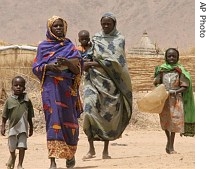-
(单词翻译:双击或拖选)
Goz Beida, Chad
16 May 2007
In Chad, people are still arriving at camps to escape ethnic1 violence and bandit attacks along the Sudanese border. Humanitarian2 workers are often the first to reach out to people escaping from burning villages, rape3 and looting. Because this remote border area in east Chad is considered a high-danger post, most humanitarian organizations do not allow staff to bring their families. Phuong Tran talked to a Rwandan relief worker in Goz Beida, and has this report for VOA.
 |
| Women and children at the Koubigou refugee camp in eastern Chad, 28 March 2007 |
Waves of fighting have pushed Chadians into camps like this one, in Koukou. They arrive daily, some emerging from the forest where they have been in hiding, many for weeks.
This time last year, there were about 25,000 Chadians in these camps. Now, there are some 150,000, scattered4 throughout the east.
The routine is similar for each wave. New arrivals wait in the 40-plus degree heat for their names to be called so they can pick up a kettle, a mat and blanket.
Some line up to pump water, as humanitarian groups rush to drill more water wells, nearby. Gilbert Nkusi is the water project officer for the United Nations Children's Fund in Goz Beida, eastern Chad.
He says hygiene5 is horrible here. As more Chadians squeeze into the camps, Nkusi's group tries to disinfect water more quickly, with chloride and ultraviolet rays. This helps to prevent diseases like cholera6 from spreading in the camps.
As Nkusi checks on the water pumps in each camp, he says the children remind him of his own childhood.
"I have lived through what these displaced children have, not understanding why they are separated from their families and not having any idea why there is a conflict," he recalls. "When I was five years old, I was displaced in Rwanda."
Nkusi says he remembers seeing, as a child, fighting between warring ethnic groups. He says, even though different ethnic groups are fighting in Sudan and Chad, the confusion for children caught up in the conflict is the same.
His own five children are in Ottawa, Canada, with his wife. He sees them every two months for about one week.
"Our own families are far from us, which makes it even harder to work in circumstances where almost every day there are attacks by the Janjaweed [Sudanese] militia7 or rebels fighting against government forces," he explains.
The United Nations cut back its staff in eastern Chad, late last year, because of the increasing violence. Most of those laid off have not returned.
The Chad government says it cannot protect civilians8 or humanitarian workers in this region.
The United Nations is still negotiating with leaders from both Chad and Sudan to post more international peacekeepers along the lawless and often violent border.
Back at the camp in Koukou, humanitarian worker Nkusi must leave by 18 hours, to avoid being on the streets past the nightly curfew.
 收听单词发音
收听单词发音
1
ethnic

|
|
| adj.人种的,种族的,异教徒的 | |
参考例句: |
|
|
|
2
humanitarian

|
|
| n.人道主义者,博爱者,基督凡人论者 | |
参考例句: |
|
|
|
3
rape

|
|
| n.抢夺,掠夺,强奸;vt.掠夺,抢夺,强奸 | |
参考例句: |
|
|
|
4
scattered

|
|
| adj.分散的,稀疏的;散步的;疏疏落落的 | |
参考例句: |
|
|
|
5
hygiene

|
|
| n.健康法,卫生学 (a.hygienic) | |
参考例句: |
|
|
|
6
cholera

|
|
| n.霍乱 | |
参考例句: |
|
|
|
7
militia

|
|
| n.民兵,民兵组织 | |
参考例句: |
|
|
|
8
civilians

|
|
| 平民,百姓( civilian的名词复数 ); 老百姓 | |
参考例句: |
|
|
|















